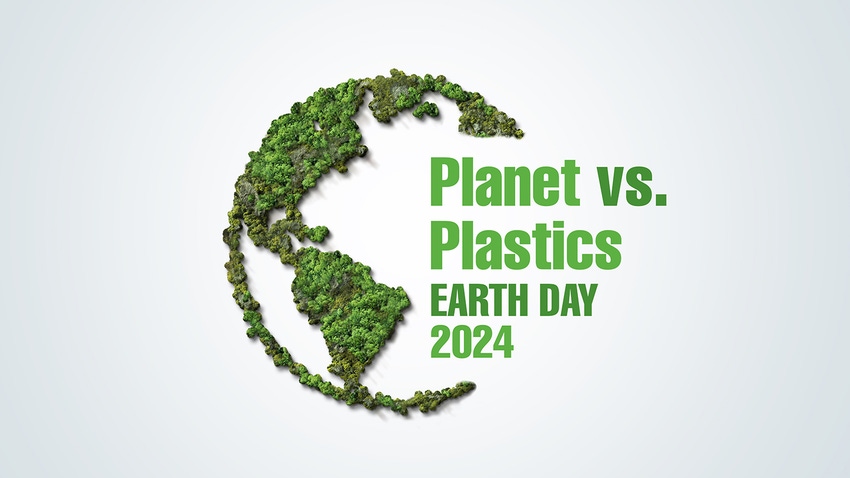What Earth Day 2024 Gets Wrong
This year’s theme — Planet vs. Plastics — squeezes a complex set of issues into a simplistic slogan that helps no one.
April 19, 2024

So, it’s “Planet vs. Plastics,” is it?
As you may have heard, that’s the theme for this year’s Earth Day, which falls on April 22. Underscoring this admittedly catchy slogan, Earthday.org is calling for a “60% reduction in the production of plastics by 2040 and an ultimate goal of building a plastic-free future for generations to come.” All I can say is: Be careful what you wish for. A world without plastics might not be the Eden you imagine.
I won’t argue that the plastics industry hasn't been its own worst enemy at times. Misleading and frankly false claims of recycling advanced in the late 1980s, when the infrastructure needed to make good on those claims was virtually nonexistent, have come back to haunt the industry.
Those chasing arrows, it turned out, were really just going round in circles. That decades-old storyline continues to feed a media narrative, however, that simply ignores the technological progress in the last couple of decades.
CBS piles on.
Just last week, CBS Sunday Morning did another hit piece on the plastics industry, basing some of its reporting on a paper from the Center for Climate Integrity, “The Fraud of Plastic Recycling,” which John Spevacek roundly critiqued last month in PlasticsToday.
Matt Seaholm, president and CEO of the Plastics Industry Association, rightly characterized the CBS piece as a “one-sided, biased view of recycling, citing false claims that plastic materials cannot be recycled – nothing could be further from the truth. By showcasing extremists who denounce recycling and have no interest in finding actual solutions to addressing plastic waste, CBS has amplified the false narratives of privately funded organizations that seek to eliminate plastic altogether.”
Here's the video. Judge for yourself.
Binary formulations may work well for Hollywood blockbusters, but they don’t articulate solutions for the real world. Consider the number of lives made better and, yes, saved because of single-use plastic medical devices. Plastic packaging has contributed to food safety and reduced food waste. Vehicles are more fuel-efficient than ever because of lightweighting through metal replacement. Ditto for increased range in EVs. Not to mention overall convenience for consumers in countless ways.
In terms of sustainability from a cradle-to-grave perspective, we have published numerous articles showing that plastic is less environmentally damaging than many of the alternatives. I won’t re-litigate the matter here, but rather invite you to comb through our Dispatches from the War on Plastics section on our home page.
Planet and Plastics
I like Ross Eisenberg’s suggestion on LinkedIn that in lieu of Planet vs. Plastics the slogan should be Planet and Plastics. The president of America’s Plastics Makers, which is associated with the American Chemistry Council, makes his case by listing the United Nations’ Sustainable Development Goals (SDGs) and illustrating how plastics help to achieve those objectives. For example, the UN says nearly one-third of the world’s food is lost or wasted each year, Eisenberg writes. To achieve the goal of zero hunger, plastic can be a valuable tool in “reducing food spoilage and helping curb food waste.” Likewise, plastics play a crucial role in meeting the UN goal for climate action by lightweighting vehicles and improving fuel efficiency. “Today’s cars, on average, are made of about 50% plastics by volume but only 10% by weight,” he notes. There is a lengthy list, which I invite you to read.
I reached out to some people in the PlasticsToday orbit and asked them to comment on the singular focus of Earth Day 2024 and suggest sensible sustainable solutions to the plastic waste epidemic as an alternative to the scorched Earth approach of many activist organizations (to which we can now add Earthday.org, I guess). Here are some edited excerpts of what they said.
‘No one wants waste in their countries, but everyone wants reduced pollution.’
Doug Woodring is founder and managing director of Ocean Recovery Alliance, an NGO that is focused on solutions and what it calls “actionism,” as opposed to activism, in seeking to work with all stakeholders in a constructive manner. He argues that the interchangeable use of the words “plastic” and “waste” has significant ramifications with respect to global circularity and trade.
"No one wants waste in their countries, but everyone wants reduced pollution,” he writes in an as-yet unpublished article he shared with PlasticsToday. “Most of the technologies exist to repurpose almost every type of plastic made today, without turning it into energy or being landfilled; they are just not widely scaled or available,” he adds.
Woodring told PlasticsToday that, in his view, the best and easiest way to recover materials from our communities is through “wet” and “dry” sorting. “This simplicity allows anyone in the world to follow and understand what it means, results in a much higher recovery rate for all waste streams, whether sorted by hand or machines (including organics — the “wet”) as it avoids contamination, which is where the cost of cleaning/sorting/recycling comes in. This would require a re-think in societal change and messaging in the way waste is collected from most cities today, but it is the fastest way to create a circular economy for our waste materials,” he noted.
Ocean Recovery Alliance walks the walk. The organization’s Harvest Plastic program focuses only on plastic from village households in both Indonesia and Cambodia, collecting all 1 to 7 types of plastic and netting an 85%+ recovery rate for the plastic collected. “Our unique engagement with villages has the immediate effect of avoiding dumping into rivers and the environment, and open burning, which is a huge option used in much of the world."
‘A simplistic, binary choice.’
Society of Plastics Engineers (SPE) President Conor Carlin regrets that Earth Day 2024 has chosen such a divisive theme. It offers a “simplistic, binary choice, as if we don't have to work together on a shared planet. It is certainly the case that plastics are being singled out as an environmental menace, yet groups such as Project Drawdown show that there are many challenges we can tackle to have an even greater [effect] on reducing our environmental impact,” said Carlin. “And while people in our industry can always point to the benefits of plastic materials — lighter, more efficient, enabling GHG reductions, etc. — we must keep our own house tidy. As a global community of individual members working in every nook and cranny of the world of polymers, SPE is helping to join the dots to both celebrate the good work being done at the nexus of plastics and sustainability, and to recognize emerging areas of growth, particularly in bio-based materials and related ecosystems.”
On that note, he recommends subscribing to Bioplastics Magazine. Established in 2006, “this publication is always full of new developments, new startups, new products in the growing world of bio-based polymers. It is remarkable to see so much innovation from multiple nodes across the globe," said Carlin. “The challenge for bioplastics, of course, is the long head start and massive efficiencies linked to fossil-based materials. But like Aesop showed all those years ago, the tortoise wins the race in the end.”
Carlin also commends materials supplier Arkema for publishing one of the “most comprehensive and data-driven sustainability reports” that he has read. “Sustainability is not simply about reducing single-use packaging — it is fundamentally about making sure that we don't over-exploit resources now to the detriment of future generations,” Carlin told PlasticsToday. “Arkema highlights multiple case studies and testimonials across its organization where both technical and cultural changes result in lowered emissions, reduced pollution, and better resource management.”
‘We have to re-frame our mindset around these polymers.’
For Joy Rifkin, sustainability and training manager at Lakeshore Recycling Systems, the invention of plastics revolutionized our lives in countless beneficial ways but also led to the notion of disposability and single use.
"Convenience became paramount, and people began using plastic products for a few minutes and then throwing them away,” said Rifkin. “We have to re-frame our mindset around these polymers. They are helpful and needed in society, but we’ve got to treat plastic as a resource, and not an item to be discarded after a few minutes of use. And right now,” she adds, “we use too much plastic without a robust network of recycling options.”
'It’s not productive to pit one type [of packaging] against another.'
No matter the material — glass, metal, paper, or plastic — packaging plays a crucial role in American life, writes the American Institute for Packaging and the Environment (Ameripen) in a press release distributed ahead of Earth Day.
“All kinds of packaging materials have value, and it’s not productive to pit one type against another,” Ameripen Executive Director Dan Felton notes. “Here at Ameripen, we believe that the most critical work can be done at a holistic level, advocating for progressive, proactive, and evidence-based policies and strategies to advance sustainable packaging systems.”
As such, the association supports federal legislation that unifies packaging claims and labels across the country, instead of a patchwork of conflicting state standards. That will help transform packaging recovery, recycling, and composting, according to Ameripen. It also advocates for increased recycling infrastructure and “well-crafted” extended producer responsibility programs.
Last, but by no means least, read Robert Lilienfeld’s article, “What Sustainable Solutions Make Sense for Plastics?”. As always, it’s an elegantly written, provocative think piece that explores today's tension between engineering and marketing and lands on a philosophical solution from ancient China.
One more thing: I have shared George Carlin’s riff on the planet’s relationship with plastics before, but given the present context, I can’t resist sharing it again. Trigger warning: There are no safe spaces when this iconoclast takes the stage.
About the Author(s)
You May Also Like




